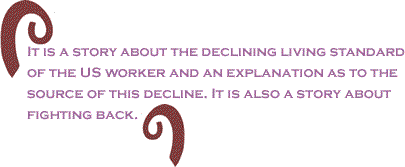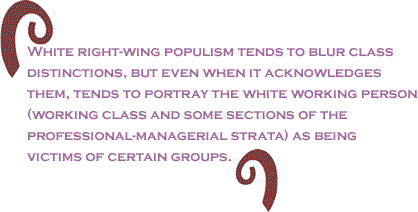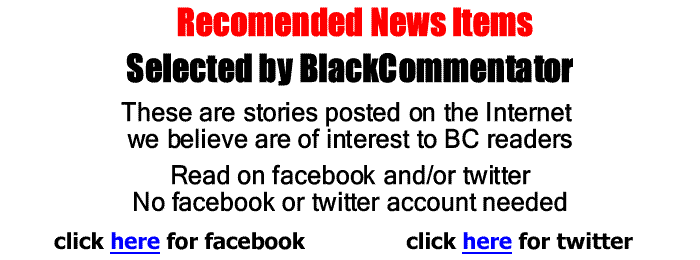
|
||||||||||||||||||||||
|
||
 |
||
Stewart
Acuff and Richard A. Levins. Getting
America Back to Work I have known Stewart Acuff for years, having met him when he was in the process of becoming the leader of the Atlanta, Georgia Central Labor Council. He rose to become the organizing director of the AFL-CIO and is currently the chief of staff for the Utility Workers Union. Acuff brings a passion to the struggle for worker�s rights and economic justice that cannot be rivaled. Thus, when he informed me that he was co-writing a book I was anxious to get hold of it. Getting America Back to Work is a very unique book. First, it is brief (89 pages). Second, it is clearly targeted at rank and file workers, both union and non-union workers. It is, more than anything else, a story in the best sense of the word. It is a story about the declining living standard of the US worker and an explanation as to the source of this decline. It is also a story about fighting back. Getting America Back to Work is part of a genre of popularly written analyses of the US economy (particularly the post-World War II economy) and the manner in which the class struggle has played out to the disadvantage of the working class. As such, this is a valuable asset for leaders in the struggle for economic justice.
Acuff and Levins offer a very different explanation. They look at the way that the system operates against working people. They are, in fact, discussing the growth of neo-liberalism but they do not use the term. They discuss the polarization of wealth and the growth in the power of the banks and corporations, and the weakening of unions, with the corresponding implications. Acuff and Levins have written a book that is very accessible. It is the sort of piece that can be used among union stewards as well as members and leaders of community-based organizations. In fact, it is a good discussion piece, helping to provide a broader context to the struggles for justice in which many of us are engaged. It also encourages them to fight back. One limitation of the book is that it falls prey to the notion of workers as �middle class.� This was something that played itself out in the 2008 election when many unions embraced the idea that an Obama administration needed to be fighting to defend the �middle class�. This framework is problematic in that ignores the reality that the working class exists as an entity, but an entity which is itself fragmented. It is the working class that the unions must be seeking to organize and strengthen and not simply that section of the working class that is better situated. What about the unemployed, for instance? What about those condemned to low wage and/or part-time employment? While Acuff and Levins may be attempting to stress that there are good jobs out there or that can be created, their reference to the �middle class� obscures the struggles that workers are facing against the employer class and the financial elite. These qualifications aside, Getting America Back to Work is precisely the sort of book that activists need to get a hold of and distribute to the organizations in which they are involved. It is a conversation-starter, and one that I will certainly be using. BlackCommentator.com Editorial Board member, Bill Fletcher, Jr., is a Senior Scholar with the Institute for Policy Studies, the immediate past president of TransAfrica Forum and co-author of, Solidarity Divided: The Crisis in Organized Labor and a New Path toward Social Justice (University of California Press), which examines the crisis of organized labor in the USA. Click here to contact Mr. Fletcher. |
||
If you would like to comment on this article, please do so below. There is a 400 character limit. You do not need a FaceBook account. Your comment will be posted here on BC instantly. Thanks. Entering your email address is not mandatory. You may also choose to enter only your first name and your location.
|
||
Thank you very much for your readership. |
||
| Any BlackCommentator.com article may be re-printed so long as it is re-printed in its entirety and full credit given to the author and www.BlackCommentator.com. If the re-print is on the Internet we additionally request a link back to the original piece on our Website. | ||
| |
||
April 29, 2010 |
| Executive Editor: David A. Love, JD |
| Managing Editor: Nancy Littlefield |
| Publisher: Peter Gamble |
| Est. April 5, 2002 |
| Printer Friendly Version in resizeable plain text format |
 |
 |
 |

|
 |
| |
| |















































